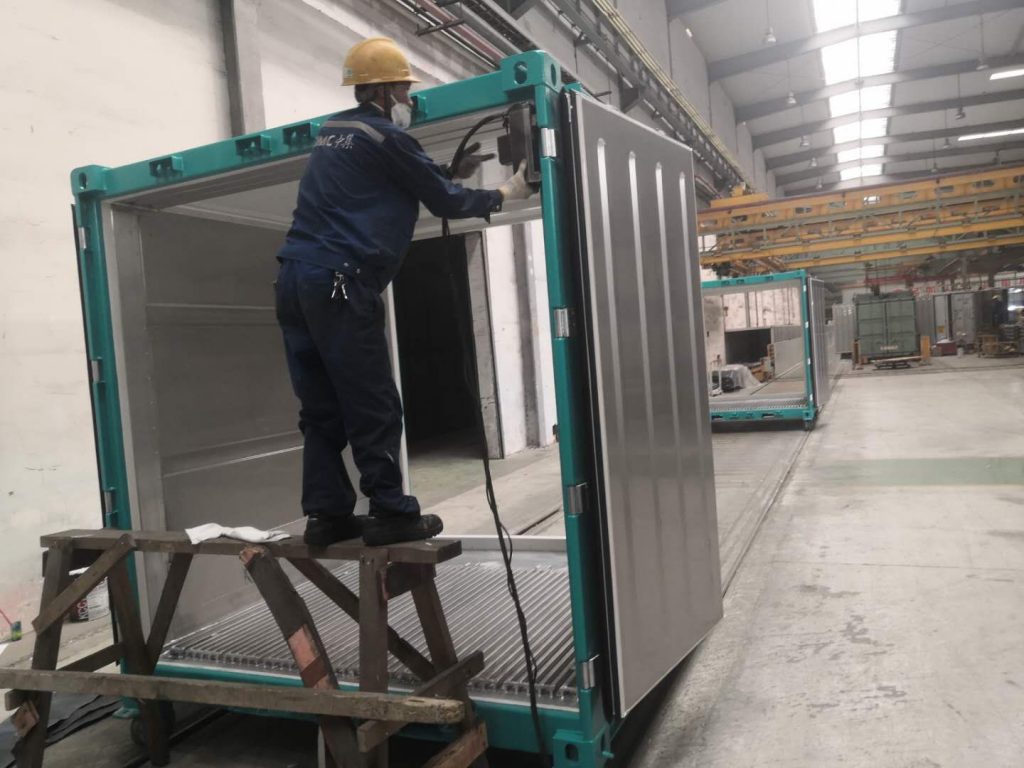An offshore reefer container is a specialised portable container unit designed for repeated use for the transportation of temperature-sensitive goods between fixed, and/or floating offshore installations and ships.
Like any type of machinery, these specialised devices need regular maintenance as they constitute expensive and complex cooling equipment prone to deterioration.
This ensures their longevity and optimal function despite the harsh conditions they are typically exposed to.
How do reefer containers get damaged?
Reefer containers can get damaged due to a variety of reasons. For example:
- Extreme weather conditions cause rust, corrosion, and paint damage to reefer container bodies.
- Material overstressing during the stacking and stowing process causes materials to fold or bend.
- Uneven distribution of weight causes container walls and floors to buckle or get dented.
- Inexperienced fork lifters causing repeated damage during the loading and unloading process.
- Contamination by chemicals or toxic substances if the cooling system is faulty.
Why is regular maintenance of offshore reefer containers important?
Reefers are designed to transport temperature-sensitive goods without breaking the cold chain.
However, they are expensive if damaged or malfunctioning.
Furthermore, the consequences of a broken reefer can be far-reaching as it can affect the products being transported as temperatures inside the container fluctuate.
This can consequently cause the temperature-sensitive goods to spoil, rot or melt. Thus, costing shippers a lot of money in lost goods.
As such, maintaining your reefers in optimal condition with regular checks is imperative and extends their usable and serviceable life. This is because factors like corrosion can quickly shorten the life span of a reefer, especially if continually exposed to salt air.

Types of repairs and inspections needed by offshore reefer containers
Rust removal
Reefers are prone to rust since they are constantly exposed to harsh elements like salt air. It is important to always perform rust removal by sandblasting, as rust can lead to holes in the container. If the rust is underneath the paint, you might need to cut it out and weld a new piece of steel.
Container floor
Reefer container floors are typically made of plywood that wears down over time due to the constant loading and unloading of goods. Because their plywood floors get scratched, scraped, and dented regularly, consider periodically replacing the floors before sneaky cracks become a major issue.
Container body fixing for holes and repainting
Consider regularly painting a special coat onto your reefer’s surface to protect its body. This extra layer helps to protect the reefer from rust and holes.
Door seals and refrigeration units
Door seals help keep reefer containers airtight or watertight. However, they disintegrate over time since they are made of rubber.
This means that they require replacement once they appear worn out. This should happen in a timely fashion to avoid the risk of spoilage of the goods.
Condenser
The compressor contains a modulating and suction solenoid valve to control the quantity of refrigerant gas flow. Since condensers are the heart of the cooling mechanism of the reefer, they should be consistently monitored and maintained. As well as replaced, if the need arises.
Evaporator
The evaporator comprises of temperature sensing bulb, a return recorder bulb sensor and a thermostatic expansion valve to control the flow of refrigerant.
This helps maintain consistent temperature levels in the reefer as the fan distributes air inside the container and directs the air via the evaporator coil. Ensure to constantly clean and fix any faulty parts within its setup.
Reefer air vents
A smooth and unhindered airflow determines how well a reefer functions to maintain the optimum temperature levels. As such, special maintenance attention must be devoted to air vents.
Reefer coils
Reefer coils and fans collect dust, dirt and condensation over time. This negatively affects how efficiently these parts operate as a whole unit. So, ensure to keep these parts clean and free of ice and other debris for efficient operation.
Circulating fans
Consider cleaning circulating fans regularly to ensure there’s continuous circulation inside the reefer.
Defrosting
Periodically defrost your reefer to improve its performance. This is because ice can build up and block circulation, thus create a flawed cooling environment. Defrosting allows all the built-up ice to melt and then be cleaned from the reefer.
Reefer washing
Washing your reefer regularly helps prevent rust and corrosion as exposure to the outdoor elements is inevitable. Be sure to also periodically clean the refrigerator box. Especially if transporting goods that may easily be contaminated by spills and residue from previous loads.
Offshore reefer system insurances for damage protection
None of us can predict the future. And with the fact that reefers are typically exposed to extreme weather conditions at sea, it’s prudent to always have them insured for damage protection.
There are three types of insurance packages to consider:
- Damage Protection Plan (DPP): DDP insurance is paid for by the reefer supplier.
- Total loss insurance: This insurance is helpful if a reefer, unfortunately, falls off the ship, or sinks with the ship.
- Premium insurance: This is all-around comprehensive insurance that covers total loss, damage and any other unpredictable risk factors.
Find a trusted reefer container rental supplier.
While planning for maintenance is essential, identifying a reliable container rental company is as important.
MGS meets all the requirements for a container rental supplier with optimal reefer solutions that ensure the safety of temperature-sensitive cargo.

Business Director
A graduate (Business) from KDU, Jason Tan, is the current Business Director (Sales) for MGS Icestorm and has been associated with the company for the past 10 years.
With over 13 years in the shipping industry, he has had a significant contribution to Malaysia’s oil and gas industry in the engine and boat supply sector.
His expertise includes managing offshore catering business, offshore reefer containers, AI technology, offshore gas tanks, A60 pressurized cabins, etc. His contributions have helped establish MGS, in partnership (joint venture) with Thermo King and Honeywell to produce state of art Offshore Reefer Container products.

